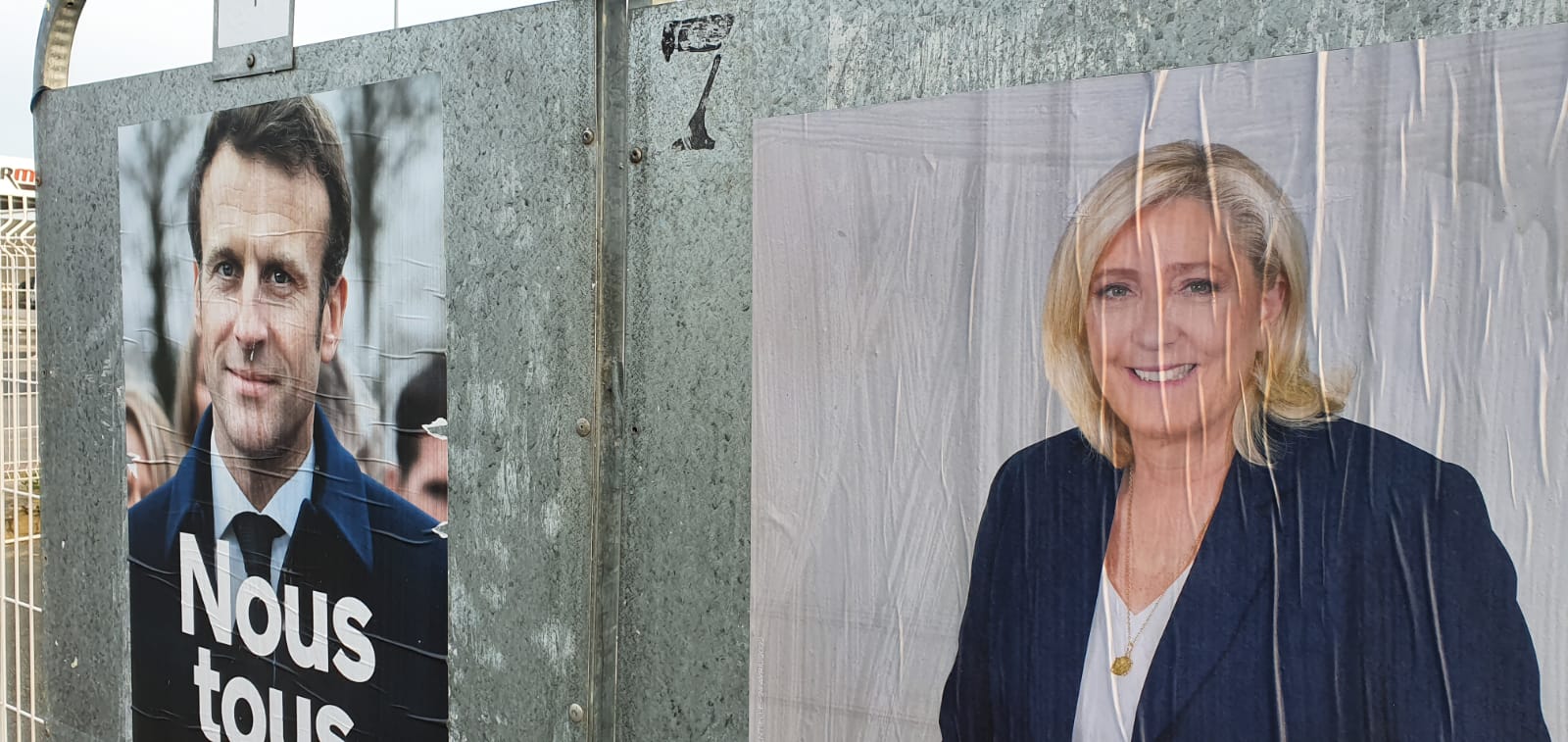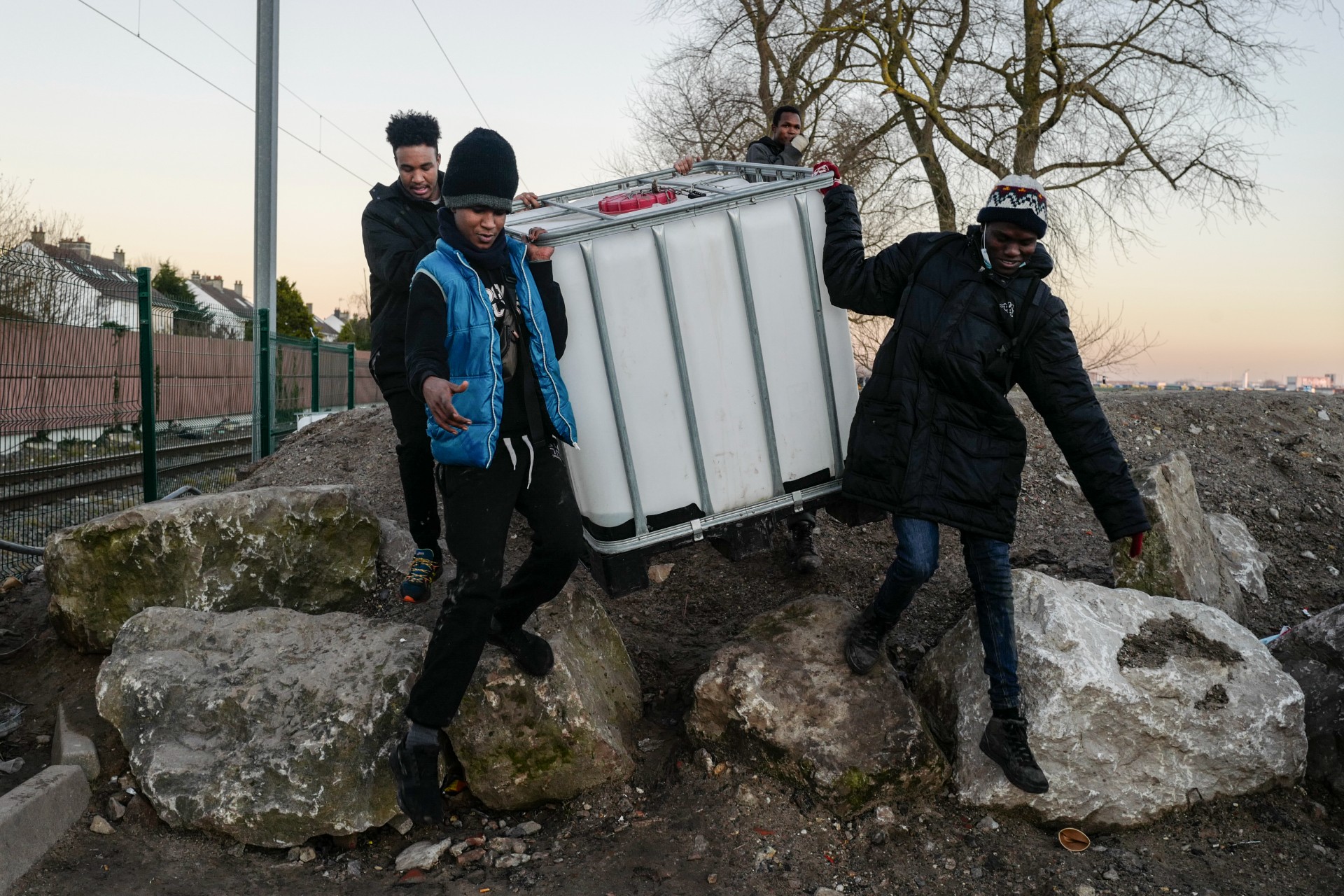France election 2022: Culture wars fail to hit home in Le Pen’s Calais heartland
On a side street in eastern Calais, a local lorry driver with a long goatee is readying for his next drive across the Channel as dusk settles over the port town.
Declining to give his name, he speaks bitterly about the few thousand displaced people who have made the town their temporary home.
A Franco-British agreement moving the UK border onto French soil has made this part of France’s north coast a choke point for people wanting to get to England. Calais in particular, which has made headlines with migration stories for decades, has become synonymous with Europe's failed asylum system.
The town is also part of the northern heartland of Marine Le Pen, whose seat is an hour away. The far-right presidential candidate's 2022 campaign has, once again, tapped into France’s nervous relationship with immigration and secularism.
Stay informed with MEE's newsletters
Sign up to get the latest alerts, insights and analysis, starting with Turkey Unpacked
Standing outside his home with his blonde wife and teenage son, the truck driver says British police fined him £2,500 ($3,265) recently when they discovered displaced men hiding in his HGV.
"We have to bring things to defend ourselves with," he says, pulling something out of an imaginary glove compartment.
Asked who they'll be voting for on Sunday, in the second round of the French presidential election, his wife shrugs and exhales: "Marine Le Pen."
“The black migrants, we’re sick of them," the man adds. "People who say otherwise are not from Calais.”
After an election campaign fought by most candidates on “culture war” issues like Islam and migration, it is exactly the type of response you might expect in Calais.
'The black migrants, we’re sick of them. People who say otherwise are not from Calais'
- Calais resident
Le Pen has promised a referendum on hard-line immigration measures if voted in, a proposal made to look mild by her far-right challenger Eric Zemmour, who proposes a ministry of remigration.
He visited Calais in January and said displaced people were dying at sea "because we’re not tough enough with them”.
“If we had told them... you won’t come to France, you will be deported as soon as you arrive, they would not be dead,” he said.
The incumbent, Emmanuel Macron, who is the favourite to win re-election, wants to tighten security on France and Europe’s borders. He has pandered to the far right during his five years in charge, and said he will ask the EU to hire more border guards if given another mandate.
Le Pen, who has also vowed to remove birthright citizenship, only give French citizens access to welfare benefits, and process asylum requests outside of Franc, got nearly 40 percent of the vote in Calais in the first round of the presidential election in early April. This was a slight increase on the 2017 election and almost the same as her score across the Pas-de-Calais region, which her party, National Rally, has come to dominate.
But most locals in the town are far less angry at the displaced than the “culture wars” would lead you to believe.
'You felt you were in a foreign country'
Standing at the bar of a betting shop-cum-cafe, Marcel, a 65-year-old with faded tattoos on his forearms and lifelong Le Pen voter, feels no hostility towards the groups of young men who walk around town and sit talking on benches in parks.
He described them as "unfortunate… they left because it’s war”.
Why is he voting Le Pen? To save his pension.
Macron's plans to overhaul the national pension system and raise the retirement age from 62 to 65 triggered mass protests during his first term in office. Le Pen has promised to keep it between 60 and 62.
The owner of the cafe, who declined to give her name, said as she poured a beer that most of her clients voting Le Pen said they're doing so because they want rid of Macron.
“We’re not really affected by migrants here, try Route des Gravelines," she added, referring to a road in the east close to where the sprawling "Jungle" camp - once home to around 10,000 people - stood before authorities flattened it in late 2016.
On that street, at a bright brasserie busy with lunchtime customers, 49-year-old owner Jerome remembers the camp’s demolition well.
He was one of the plain-clothes police officers charged with pulling it all down. Rights groups repeatedly condemned police mistreatment of displaced people in Calais at the time.
Going into the camp "made your blood run cold", he said. "You felt you were in a foreign country."
But even when he took over the brasserie soon after as displaced people set up tents on the other side of the road, nothing "serious" happened, only minor "incivilities".
Migration won’t affect his vote, he said, adding that he barely even talks about the situation now he is unaffected by it.
“We’re resigned to it,” he said. “As long as Calais is near Dover… Calaisiens feel that the situation is going to stay the same."
Asked who he planned to vote for, he replied: "I'll keep that to myself."
The poverty line
People often don’t admit voting for Le Pen.
But for some people the shame has lifted recently. Despite a manifesto full of far-right policies, the 53-year-old has managed to somewhat soften her image, aided by the mainstreaming of far-right ideas in France and her even more extreme challenger Zemmour.
"I think that actually Le Pen did a great campaign, which is dangerous of course," Rim-Sarah Alouane, a researcher in comparative law at the Toulouse 1 Capitole University, told MEE.
While Zemmour made the culture war "topic du jour" - including the white supremacist conspiracy theory of the "great replacement", picked up by mainstream right-wing candidate Valerie Pecresse - Le Pen “did a campaign based mainly on social and economic issues," she added.
Le Pen’s opening remarks in the debate against Macron on Wednesday, for example, were about purchasing power, the main concern for French people going into the election.
Much more than migration, “it’s the poverty that rules over the town that worries [Calaisiens],” according to a 2021 Amnesty International poll. One in three people there live below the poverty line.
Asked by Amnesty about the displaced population, locals were most concerned about its “negative impact” on the image of Calais, particularly its economy and tourism.
Despite 30 years of what is widely seen as mismanagement of migration by successive governments, three in four Calaisiens still feel the work local NGOs do is necessary.
This does not mean the 2,000 or so displaced people in Calais - who live in makeshift sites on disused land, in woodland or beneath bridges in and around town - feel particularly welcome.
Hostile environment
Despite the local and international volunteers working to provide necessities such as food, legal information and electricity, and the Calaisiens who house people or let them have showers and wash clothes, the environment remains hostile.
Several displaced Sudanese men hoping to cross to the UK told MEE they had experienced racism from locals.
There are also regular police raids of the different sites - 168 in March alone, according to one NGO - meaning the displaced have to move their tents and belongings to avoid them being taken.
Calais-specific legislation banning distributions in certain areas makes it difficult for NGOs to give out food and water without being fined.
In December, a military 4x4 was filmed doing donuts by one of the makeshift camps - until it got stuck in the mud.
None of those passing through Calais who spoke to MEE said they were following the election; they were far more concerned about the British plan to send asylum seekers to Rwanda.
“I don’t care about the elections because I don’t want to stay,” one 18-year-old from Darfur told MEE. “We just want to get to the UK.”
One NGO coordinator told MEE that a French-speaking Chadian man had told her, “I’m waiting for the result of the election to see if I will stay.” But this attitude is rare.
“It doesn’t concern me,” a 22-year-old from Sudan's Nuba mountains said. “If they ask me I prefer Macron: he has some mercy for migrants.”
"Some migrants from Sudan and Afghanistan said Marine Le Pen is bad,” he added.
‘Not our Calais’
Sipping a beer at the counter of a portside, nautical-themed cafe, as the bar's deaf, milky-eyed Jack Russell hobbled around begging for sugar cubes, 64-year-old Didier Benson said he was "scared" of the prospect of a Le Pen presidency.
Calais has been home to migrants for decades, he added, a point repeatedly mentioned by locals. The problem isn't the people, he said, but "everything around migration".
“Barbed wire is more affecting than the migrants,” he said, referring to the kilometres of fences and walls erected on the main roads surrounding the town. “It’s ugly, traumatising - it’s not our Calais.”
In a friterie opposite the grand town hall, Monsieur Goudal, who owns five chip shops in Calais, says the town "doesn't have more of a problem than anywhere else".
“When you say to people that you're from Calais, they say, 'Oh my god, illegal immigrants', they overreact," he told MEE.
'When you live with a few euros at the end of a month in your bank account, do you really care about wokeness?'
- Aurelien Mondon, politics lecturer
“You get the impression that every day is carnage.”
Though France’s presidential election has been dominated by the right, it is not those issues that concern people most, argued Aurelien Mondon, a senior lecturer in politics at the University of Bath.
“A lot of polls in France show that most people still care more about left-wing issues than they care about all the right-wing issues,” he told MEE.
Alongside purchasing power, healthcare and pensions score highly on French people’s concerns going into the election, alongside other social, economic and environmental issues. “And nonetheless, we talk about the right-wing issues," Mondon said.
Ten percent of French people said immigration was one of the two biggest issues facing their country in the latest Eurobarometer poll, a number that often rises depending on the news cycle, said Mondon.
But asked which are the two biggest issues facing them personally, immigration scores far lower: just two percent.
“When you live with a few euros at the end of a month in your bank account, do you really care about wokeness? Do you really care about Islam? Do you really care about trans people?” Mondon said.
“No, of course not. What you care about is your pension, the education of your children, whether you'll be able to pay your rent.”
This article is available in French on Middle East Eye French edition.
Middle East Eye delivers independent and unrivalled coverage and analysis of the Middle East, North Africa and beyond. To learn more about republishing this content and the associated fees, please fill out this form. More about MEE can be found here.







